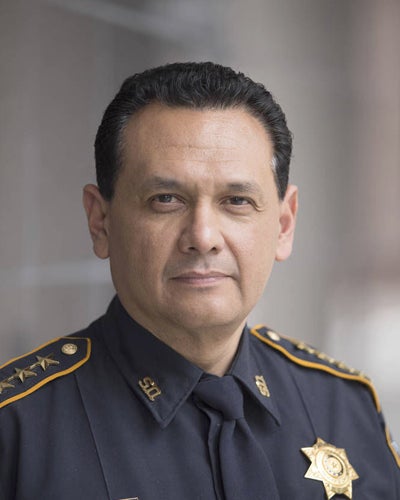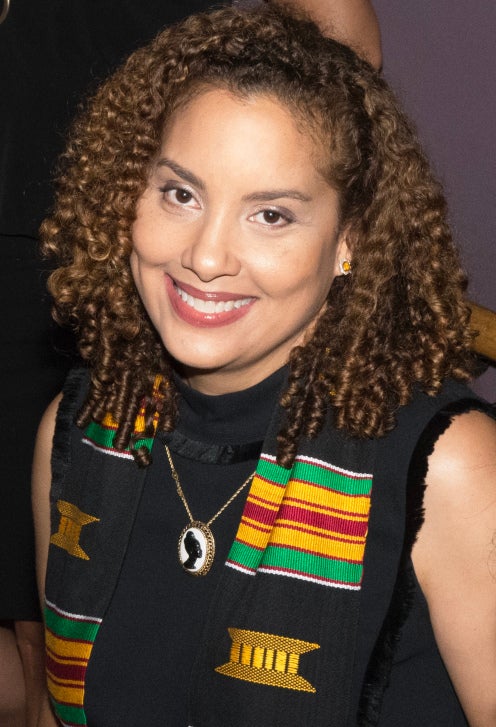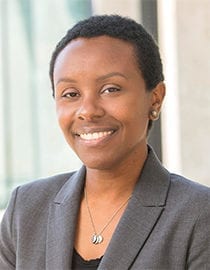The criminal system in the United States can be a powerful mechanism for generating and redistributing wealth, and policing is central to that function. Historically, according to organizers of a recent panel on the economics of policing, a broad array of governmental entities have used policing to control the labor pool, generate revenue, and redistribute resources away from heavily policed populations.
On Feb. 12, Harvard Law School Professors Alexandra Natapoff and Andrew Manuel Crespo ’08 organized a panel discussion, “The Economics of Policing,” which focused on the myriad ways money and wealth influence criminal processes and outcomes. Panelists included Ed Gonzalez, sheriff, Harris County, Texas, Alexes Harris, a professor of sociology at the University of Washington and author of “A Pound of Flesh: Monetary Sanctions as Punishment for the Poor,” and Abbye Atkinson ’09, an assistant professor at the University of California, Berkeley School of Law and an expert in the law of contracts and consumer protection.
The event was part of the virtual “Policing in America” lecture series, which brings together an interdisciplinary group of scholars in conversation with police, prosecutors, activists, and other leading voices to analyze the complex and democratically vital questions raised by the institution of American policing.
The series, co-organized by Natapoff and Crespo, is one of several that Harvard Law School has hosted over the past year touching on different aspects of the intersection of race and the law; among the others are “COVID-19 and the Law” and “Racial Equality?”
In her opening remarks, Natapoff said, “Although we don’t always think about it this way, policing and our criminal system more generally are some of our most influential economic institutions. It is through policing that we redistribute billions of dollars every year — we take money from people and we give it to institutions; sometimes cities, sometimes courts, sometimes the very same policing and cultural institutions that run the policing process.”
Gonzalez, an 18-year veteran of the Houston Police Department, said: “In our country, we spend billions of dollars every year on mass incarceration and for me, even as a law enforcement professional, it’s money that’s not well spent. There’s a bureaucracy behind the criminal justice system that leads to many inefficiencies.”

According to Gonzalez, Harris County, which includes the city of Houston, has the largest jail system in Texas with approximately 9,000 incarcerated individuals. More than 30% are on at least one psychotropic drug, with some on multiple medications, which can cost hundreds of dollars per day. The county spends more than 60 million dollars a year just on medical care inside the confines of the jail, said Gonzalez. It is money, he believes, that would be better spent developing better healthcare out in the community.
“I am the de facto largest mental health institution in the state of Texas and that’s an embarrassment. That should not be the case. We should be finding and funding community-based responses to some of these issues; looking at these issues not through criminalization, but through the lens of public health,” he said.
Harris, an expert on the American penal system’s economic impacts on low-income individuals and communities, discussed the historical evolution of the criminalization of Black people and its association with both controlling them and using them to generate wealth for white society.

“Even at the inception of this country, slavery was a form of controlling people of African descent and allowing private entrepreneurs to generate profits from their labor,” she said, noting that slave owners had the right to lease out bodies to generate profits. In 1865, the 13th Amendment stated that neither slavery nor involuntary servitude is allowed except as punishment for crime whereas the party shall have been duly convicted. “There’s been a carve out … for people who’ve been duly convicted who can be forced to labor,” she said. “Convict leasing was the same as slave leasing where the state could lease out bodies to generate money. … We’ve just seen this new evolution of the ways in which bodies, particularly Black indigenous and Latino bodies, are used to generate money. We’ve developed this new market around the criminal legal system.”
Atkinson concurred, highlighting the historical economic incentive to exploit groups of people for the purpose of capitalist and economic gains. Atkinson pointed to the work of Eric Williams, a historian in the 1930s and 1940s whose research on slavery and capitalism explained that characterizations that identified Black men as subhuman were only the later rationalizations designed to justify the enslavement of Black people to provide desperately needed cheap labor.

She said it’s important to look at the economic backdrop, including the economic harms that are imposed on communities that are most impacted — either through the criminal justice system or in service of broader economic systems that rely on our criminal justice system to perpetuate them.
“We think about our current system of inequality and marginalization, and race inequality and race and gendered marginalization, as sort of a starting point,” Atkinson said. “I think a lot about the economic condition that surrounds their state of marginalization, but I think it’s important to begin to think how our economic system produces that marginalization and perhaps intentionally produces it.”
The series kicked off last spring with, “The Problem and the Moment: Diagnosing the American Penal System,” a panel discussion with Rachael Rollins, district attorney for Suffolk County in Boston, Missouri Congresswoman Cori Bush, who was then the Democratic nominee for Missouri’s First Congressional District; University of Virginia School of Law Professor Rachel Harmon, who has spent more than two decades studying policing issues; and Loyola Law School Professor Priscilla Ocen.
Other sessions included “The Limits to Accountability: Police, Prosecutors, and Qualified Immunity,” and “Police Unions and Politics.”
On March 11, a new documentary about the racial history and modern discrimination of the American misdemeanor system will premiere at HLS as part of the policing series. The film, “Racially Charged: America’s Misdemeanor Problem,” produced by Brave New Films and directed by Robert Greenwald, was inspired by Professor Natapoff’s book “Punishment Without Crime.”
The HLS Policing in America series will wrap up on April 2 with a panel discussion, “Activism and Engagement: What Can Lawyers Do?,” focused on the role of law, lawyers, and legal change in the current social movement for racial justice in the criminal system. Videos of every session of the series are made available afterwards on the Harvard Law School YouTube channel.
